Exploring Business Ethics and Organizational Health
VerifiedAdded on 2020/04/21
|13
|3635
|79
AI Summary
This assignment delves into the crucial relationship between ethics, organizational health, and business success. It encourages students to analyze the influence of ethical decision-making, employee skills training, professionalism, and respect within organizations. The assignment also touches upon factors like corporate governance, sustainability, and social responsibility, highlighting their impact on overall performance.
Contribute Materials
Your contribution can guide someone’s learning journey. Share your
documents today.
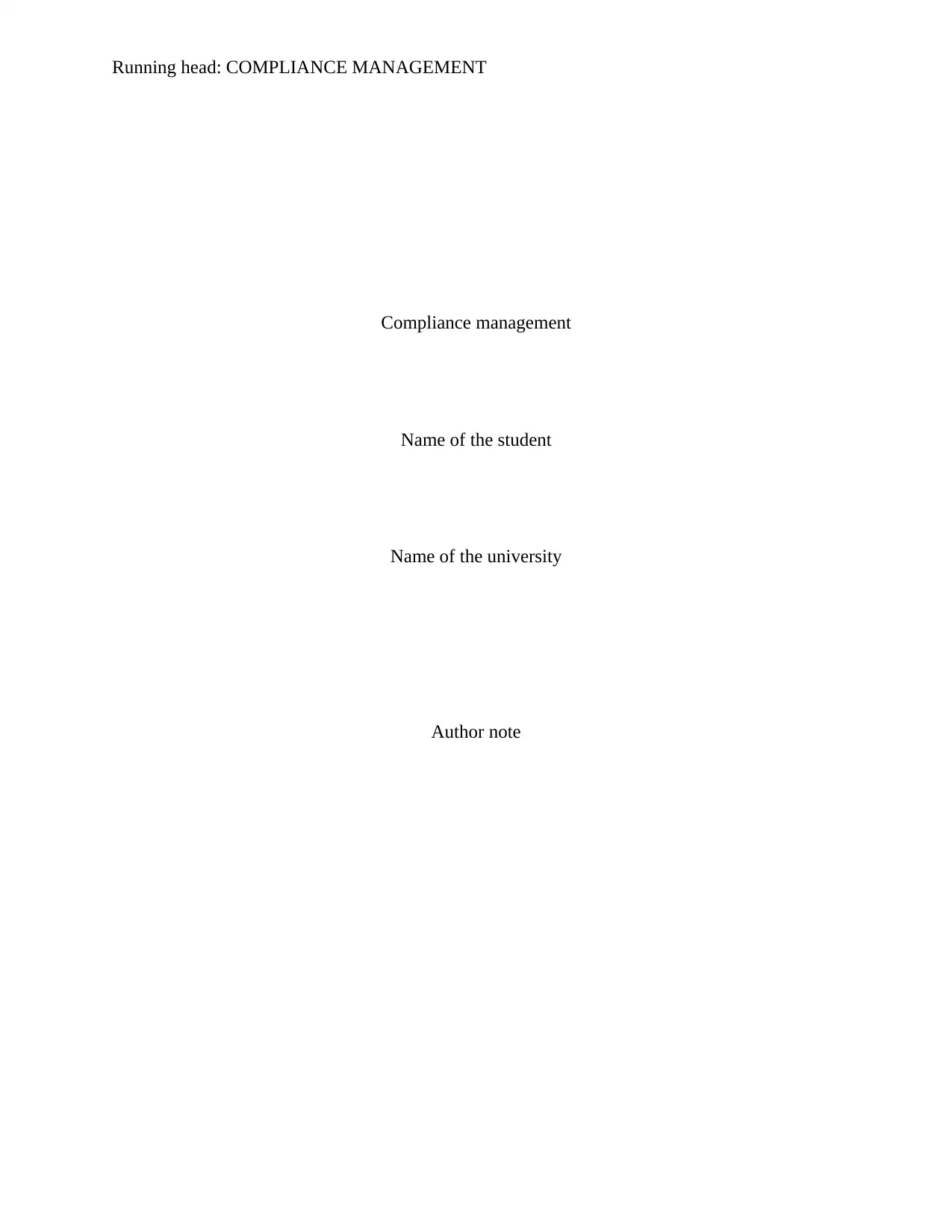
Running head: COMPLIANCE MANAGEMENT
Compliance management
Name of the student
Name of the university
Author note
Compliance management
Name of the student
Name of the university
Author note
Secure Best Marks with AI Grader
Need help grading? Try our AI Grader for instant feedback on your assignments.
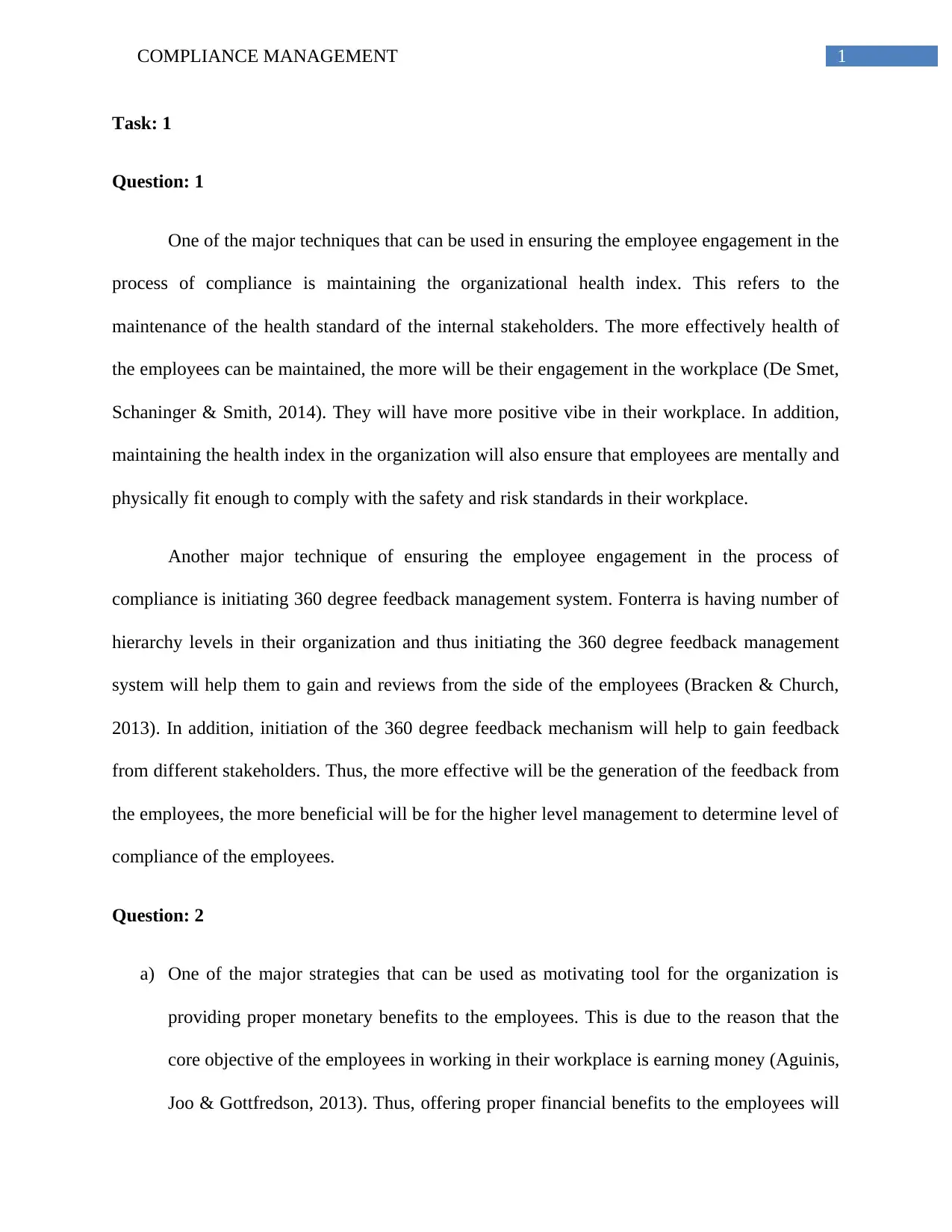
1COMPLIANCE MANAGEMENT
Task: 1
Question: 1
One of the major techniques that can be used in ensuring the employee engagement in the
process of compliance is maintaining the organizational health index. This refers to the
maintenance of the health standard of the internal stakeholders. The more effectively health of
the employees can be maintained, the more will be their engagement in the workplace (De Smet,
Schaninger & Smith, 2014). They will have more positive vibe in their workplace. In addition,
maintaining the health index in the organization will also ensure that employees are mentally and
physically fit enough to comply with the safety and risk standards in their workplace.
Another major technique of ensuring the employee engagement in the process of
compliance is initiating 360 degree feedback management system. Fonterra is having number of
hierarchy levels in their organization and thus initiating the 360 degree feedback management
system will help them to gain and reviews from the side of the employees (Bracken & Church,
2013). In addition, initiation of the 360 degree feedback mechanism will help to gain feedback
from different stakeholders. Thus, the more effective will be the generation of the feedback from
the employees, the more beneficial will be for the higher level management to determine level of
compliance of the employees.
Question: 2
a) One of the major strategies that can be used as motivating tool for the organization is
providing proper monetary benefits to the employees. This is due to the reason that the
core objective of the employees in working in their workplace is earning money (Aguinis,
Joo & Gottfredson, 2013). Thus, offering proper financial benefits to the employees will
Task: 1
Question: 1
One of the major techniques that can be used in ensuring the employee engagement in the
process of compliance is maintaining the organizational health index. This refers to the
maintenance of the health standard of the internal stakeholders. The more effectively health of
the employees can be maintained, the more will be their engagement in the workplace (De Smet,
Schaninger & Smith, 2014). They will have more positive vibe in their workplace. In addition,
maintaining the health index in the organization will also ensure that employees are mentally and
physically fit enough to comply with the safety and risk standards in their workplace.
Another major technique of ensuring the employee engagement in the process of
compliance is initiating 360 degree feedback management system. Fonterra is having number of
hierarchy levels in their organization and thus initiating the 360 degree feedback management
system will help them to gain and reviews from the side of the employees (Bracken & Church,
2013). In addition, initiation of the 360 degree feedback mechanism will help to gain feedback
from different stakeholders. Thus, the more effective will be the generation of the feedback from
the employees, the more beneficial will be for the higher level management to determine level of
compliance of the employees.
Question: 2
a) One of the major strategies that can be used as motivating tool for the organization is
providing proper monetary benefits to the employees. This is due to the reason that the
core objective of the employees in working in their workplace is earning money (Aguinis,
Joo & Gottfredson, 2013). Thus, offering proper financial benefits to the employees will
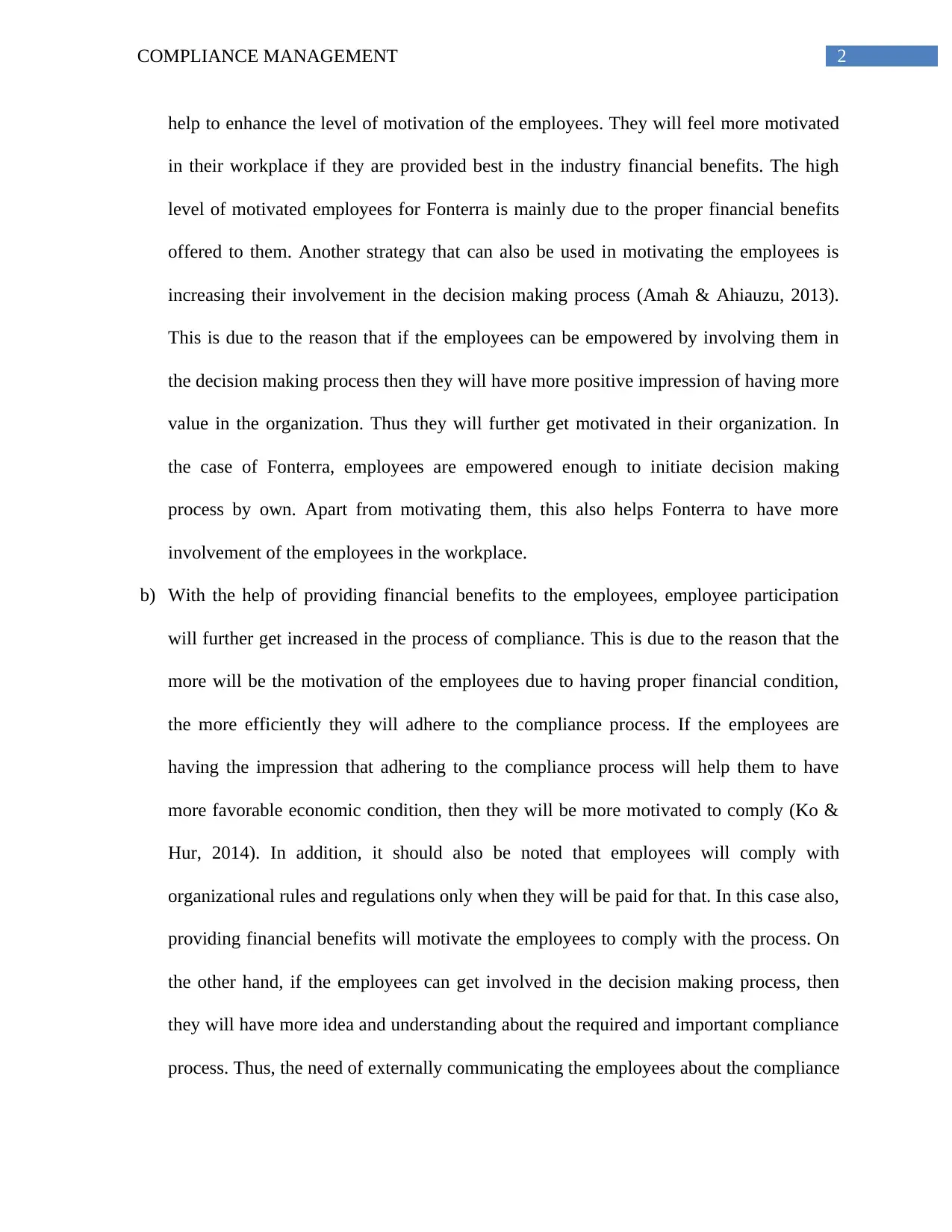
2COMPLIANCE MANAGEMENT
help to enhance the level of motivation of the employees. They will feel more motivated
in their workplace if they are provided best in the industry financial benefits. The high
level of motivated employees for Fonterra is mainly due to the proper financial benefits
offered to them. Another strategy that can also be used in motivating the employees is
increasing their involvement in the decision making process (Amah & Ahiauzu, 2013).
This is due to the reason that if the employees can be empowered by involving them in
the decision making process then they will have more positive impression of having more
value in the organization. Thus they will further get motivated in their organization. In
the case of Fonterra, employees are empowered enough to initiate decision making
process by own. Apart from motivating them, this also helps Fonterra to have more
involvement of the employees in the workplace.
b) With the help of providing financial benefits to the employees, employee participation
will further get increased in the process of compliance. This is due to the reason that the
more will be the motivation of the employees due to having proper financial condition,
the more efficiently they will adhere to the compliance process. If the employees are
having the impression that adhering to the compliance process will help them to have
more favorable economic condition, then they will be more motivated to comply (Ko &
Hur, 2014). In addition, it should also be noted that employees will comply with
organizational rules and regulations only when they will be paid for that. In this case also,
providing financial benefits will motivate the employees to comply with the process. On
the other hand, if the employees can get involved in the decision making process, then
they will have more idea and understanding about the required and important compliance
process. Thus, the need of externally communicating the employees about the compliance
help to enhance the level of motivation of the employees. They will feel more motivated
in their workplace if they are provided best in the industry financial benefits. The high
level of motivated employees for Fonterra is mainly due to the proper financial benefits
offered to them. Another strategy that can also be used in motivating the employees is
increasing their involvement in the decision making process (Amah & Ahiauzu, 2013).
This is due to the reason that if the employees can be empowered by involving them in
the decision making process then they will have more positive impression of having more
value in the organization. Thus they will further get motivated in their organization. In
the case of Fonterra, employees are empowered enough to initiate decision making
process by own. Apart from motivating them, this also helps Fonterra to have more
involvement of the employees in the workplace.
b) With the help of providing financial benefits to the employees, employee participation
will further get increased in the process of compliance. This is due to the reason that the
more will be the motivation of the employees due to having proper financial condition,
the more efficiently they will adhere to the compliance process. If the employees are
having the impression that adhering to the compliance process will help them to have
more favorable economic condition, then they will be more motivated to comply (Ko &
Hur, 2014). In addition, it should also be noted that employees will comply with
organizational rules and regulations only when they will be paid for that. In this case also,
providing financial benefits will motivate the employees to comply with the process. On
the other hand, if the employees can get involved in the decision making process, then
they will have more idea and understanding about the required and important compliance
process. Thus, the need of externally communicating the employees about the compliance
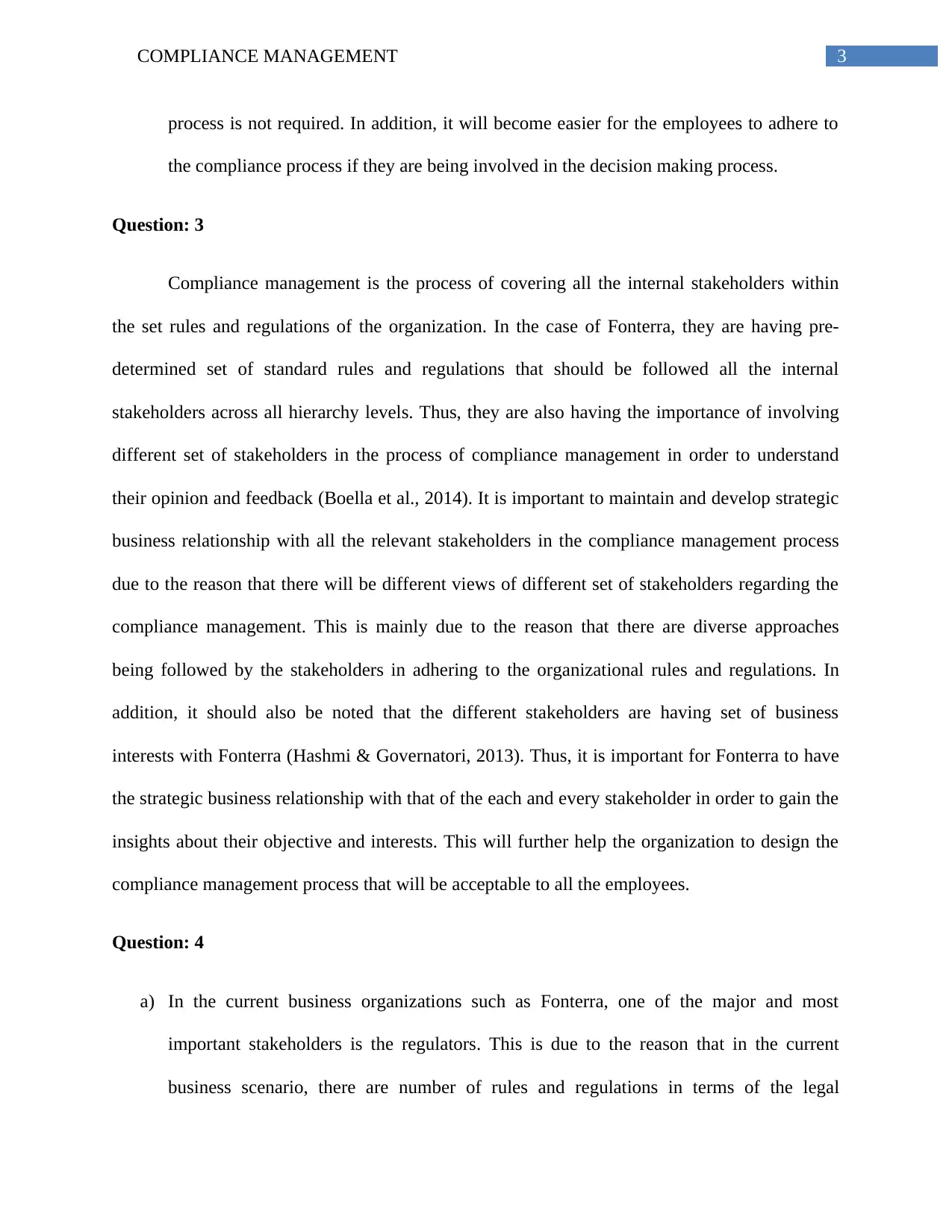
3COMPLIANCE MANAGEMENT
process is not required. In addition, it will become easier for the employees to adhere to
the compliance process if they are being involved in the decision making process.
Question: 3
Compliance management is the process of covering all the internal stakeholders within
the set rules and regulations of the organization. In the case of Fonterra, they are having pre-
determined set of standard rules and regulations that should be followed all the internal
stakeholders across all hierarchy levels. Thus, they are also having the importance of involving
different set of stakeholders in the process of compliance management in order to understand
their opinion and feedback (Boella et al., 2014). It is important to maintain and develop strategic
business relationship with all the relevant stakeholders in the compliance management process
due to the reason that there will be different views of different set of stakeholders regarding the
compliance management. This is mainly due to the reason that there are diverse approaches
being followed by the stakeholders in adhering to the organizational rules and regulations. In
addition, it should also be noted that the different stakeholders are having set of business
interests with Fonterra (Hashmi & Governatori, 2013). Thus, it is important for Fonterra to have
the strategic business relationship with that of the each and every stakeholder in order to gain the
insights about their objective and interests. This will further help the organization to design the
compliance management process that will be acceptable to all the employees.
Question: 4
a) In the current business organizations such as Fonterra, one of the major and most
important stakeholders is the regulators. This is due to the reason that in the current
business scenario, there are number of rules and regulations in terms of the legal
process is not required. In addition, it will become easier for the employees to adhere to
the compliance process if they are being involved in the decision making process.
Question: 3
Compliance management is the process of covering all the internal stakeholders within
the set rules and regulations of the organization. In the case of Fonterra, they are having pre-
determined set of standard rules and regulations that should be followed all the internal
stakeholders across all hierarchy levels. Thus, they are also having the importance of involving
different set of stakeholders in the process of compliance management in order to understand
their opinion and feedback (Boella et al., 2014). It is important to maintain and develop strategic
business relationship with all the relevant stakeholders in the compliance management process
due to the reason that there will be different views of different set of stakeholders regarding the
compliance management. This is mainly due to the reason that there are diverse approaches
being followed by the stakeholders in adhering to the organizational rules and regulations. In
addition, it should also be noted that the different stakeholders are having set of business
interests with Fonterra (Hashmi & Governatori, 2013). Thus, it is important for Fonterra to have
the strategic business relationship with that of the each and every stakeholder in order to gain the
insights about their objective and interests. This will further help the organization to design the
compliance management process that will be acceptable to all the employees.
Question: 4
a) In the current business organizations such as Fonterra, one of the major and most
important stakeholders is the regulators. This is due to the reason that in the current
business scenario, there are number of rules and regulations in terms of the legal
Secure Best Marks with AI Grader
Need help grading? Try our AI Grader for instant feedback on your assignments.
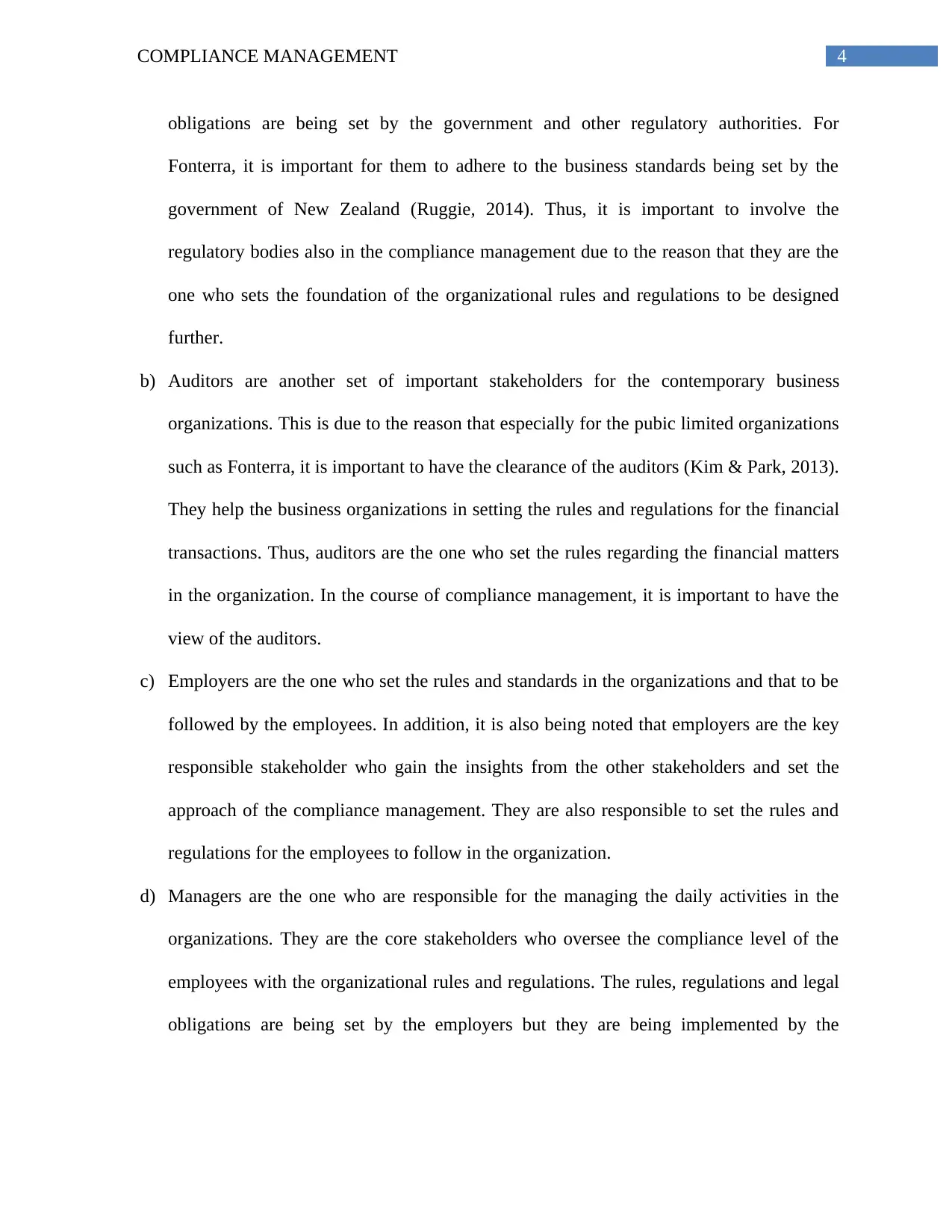
4COMPLIANCE MANAGEMENT
obligations are being set by the government and other regulatory authorities. For
Fonterra, it is important for them to adhere to the business standards being set by the
government of New Zealand (Ruggie, 2014). Thus, it is important to involve the
regulatory bodies also in the compliance management due to the reason that they are the
one who sets the foundation of the organizational rules and regulations to be designed
further.
b) Auditors are another set of important stakeholders for the contemporary business
organizations. This is due to the reason that especially for the pubic limited organizations
such as Fonterra, it is important to have the clearance of the auditors (Kim & Park, 2013).
They help the business organizations in setting the rules and regulations for the financial
transactions. Thus, auditors are the one who set the rules regarding the financial matters
in the organization. In the course of compliance management, it is important to have the
view of the auditors.
c) Employers are the one who set the rules and standards in the organizations and that to be
followed by the employees. In addition, it is also being noted that employers are the key
responsible stakeholder who gain the insights from the other stakeholders and set the
approach of the compliance management. They are also responsible to set the rules and
regulations for the employees to follow in the organization.
d) Managers are the one who are responsible for the managing the daily activities in the
organizations. They are the core stakeholders who oversee the compliance level of the
employees with the organizational rules and regulations. The rules, regulations and legal
obligations are being set by the employers but they are being implemented by the
obligations are being set by the government and other regulatory authorities. For
Fonterra, it is important for them to adhere to the business standards being set by the
government of New Zealand (Ruggie, 2014). Thus, it is important to involve the
regulatory bodies also in the compliance management due to the reason that they are the
one who sets the foundation of the organizational rules and regulations to be designed
further.
b) Auditors are another set of important stakeholders for the contemporary business
organizations. This is due to the reason that especially for the pubic limited organizations
such as Fonterra, it is important to have the clearance of the auditors (Kim & Park, 2013).
They help the business organizations in setting the rules and regulations for the financial
transactions. Thus, auditors are the one who set the rules regarding the financial matters
in the organization. In the course of compliance management, it is important to have the
view of the auditors.
c) Employers are the one who set the rules and standards in the organizations and that to be
followed by the employees. In addition, it is also being noted that employers are the key
responsible stakeholder who gain the insights from the other stakeholders and set the
approach of the compliance management. They are also responsible to set the rules and
regulations for the employees to follow in the organization.
d) Managers are the one who are responsible for the managing the daily activities in the
organizations. They are the core stakeholders who oversee the compliance level of the
employees with the organizational rules and regulations. The rules, regulations and legal
obligations are being set by the employers but they are being implemented by the
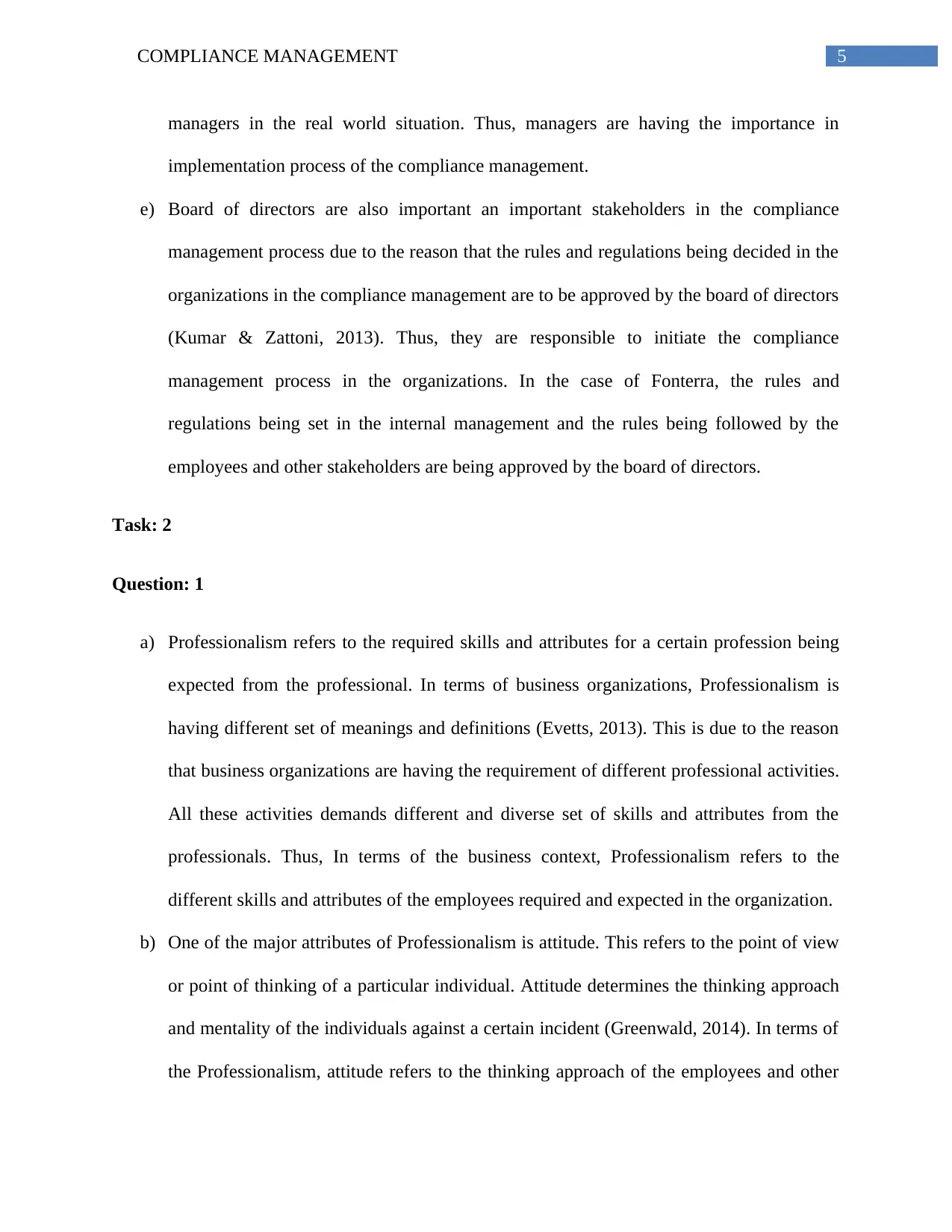
5COMPLIANCE MANAGEMENT
managers in the real world situation. Thus, managers are having the importance in
implementation process of the compliance management.
e) Board of directors are also important an important stakeholders in the compliance
management process due to the reason that the rules and regulations being decided in the
organizations in the compliance management are to be approved by the board of directors
(Kumar & Zattoni, 2013). Thus, they are responsible to initiate the compliance
management process in the organizations. In the case of Fonterra, the rules and
regulations being set in the internal management and the rules being followed by the
employees and other stakeholders are being approved by the board of directors.
Task: 2
Question: 1
a) Professionalism refers to the required skills and attributes for a certain profession being
expected from the professional. In terms of business organizations, Professionalism is
having different set of meanings and definitions (Evetts, 2013). This is due to the reason
that business organizations are having the requirement of different professional activities.
All these activities demands different and diverse set of skills and attributes from the
professionals. Thus, In terms of the business context, Professionalism refers to the
different skills and attributes of the employees required and expected in the organization.
b) One of the major attributes of Professionalism is attitude. This refers to the point of view
or point of thinking of a particular individual. Attitude determines the thinking approach
and mentality of the individuals against a certain incident (Greenwald, 2014). In terms of
the Professionalism, attitude refers to the thinking approach of the employees and other
managers in the real world situation. Thus, managers are having the importance in
implementation process of the compliance management.
e) Board of directors are also important an important stakeholders in the compliance
management process due to the reason that the rules and regulations being decided in the
organizations in the compliance management are to be approved by the board of directors
(Kumar & Zattoni, 2013). Thus, they are responsible to initiate the compliance
management process in the organizations. In the case of Fonterra, the rules and
regulations being set in the internal management and the rules being followed by the
employees and other stakeholders are being approved by the board of directors.
Task: 2
Question: 1
a) Professionalism refers to the required skills and attributes for a certain profession being
expected from the professional. In terms of business organizations, Professionalism is
having different set of meanings and definitions (Evetts, 2013). This is due to the reason
that business organizations are having the requirement of different professional activities.
All these activities demands different and diverse set of skills and attributes from the
professionals. Thus, In terms of the business context, Professionalism refers to the
different skills and attributes of the employees required and expected in the organization.
b) One of the major attributes of Professionalism is attitude. This refers to the point of view
or point of thinking of a particular individual. Attitude determines the thinking approach
and mentality of the individuals against a certain incident (Greenwald, 2014). In terms of
the Professionalism, attitude refers to the thinking approach of the employees and other
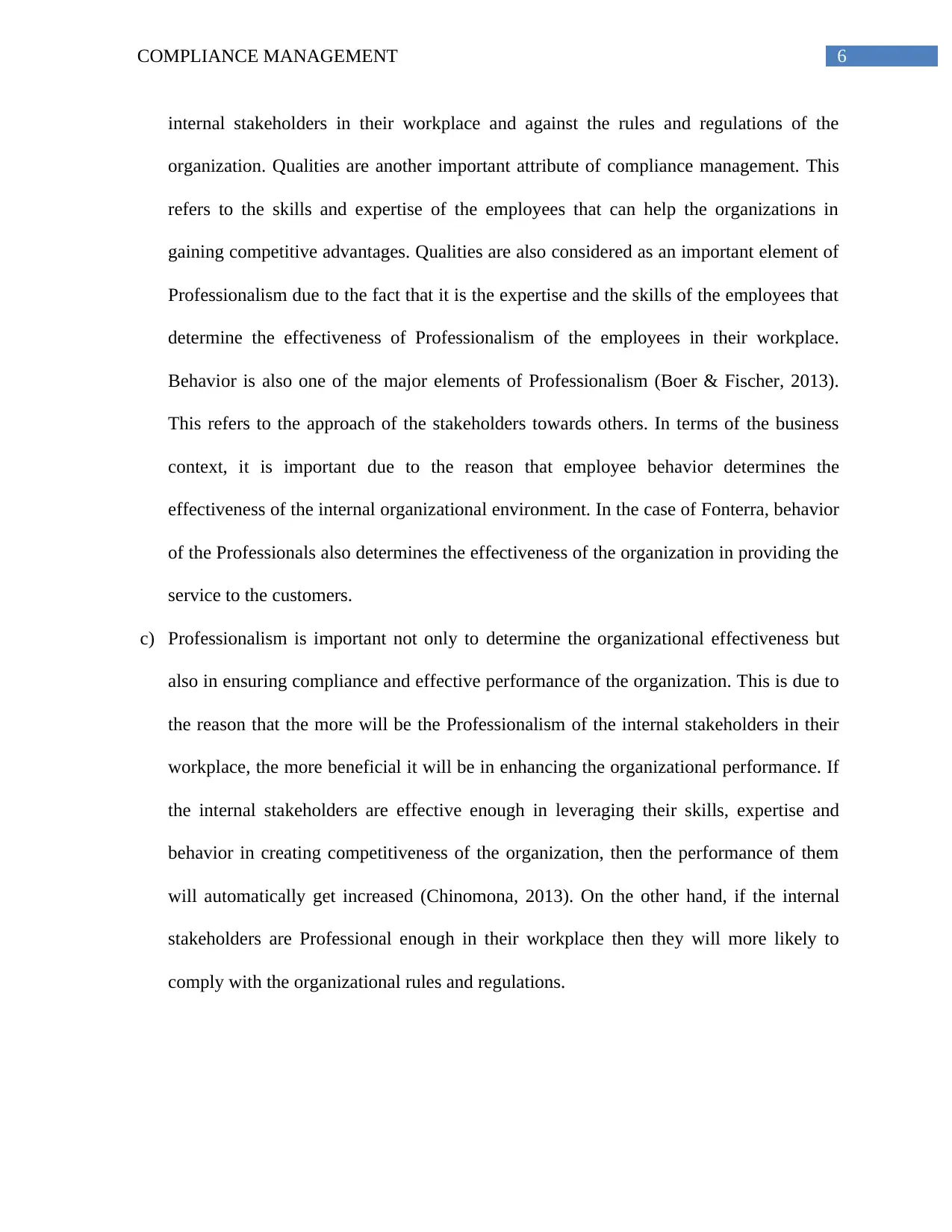
6COMPLIANCE MANAGEMENT
internal stakeholders in their workplace and against the rules and regulations of the
organization. Qualities are another important attribute of compliance management. This
refers to the skills and expertise of the employees that can help the organizations in
gaining competitive advantages. Qualities are also considered as an important element of
Professionalism due to the fact that it is the expertise and the skills of the employees that
determine the effectiveness of Professionalism of the employees in their workplace.
Behavior is also one of the major elements of Professionalism (Boer & Fischer, 2013).
This refers to the approach of the stakeholders towards others. In terms of the business
context, it is important due to the reason that employee behavior determines the
effectiveness of the internal organizational environment. In the case of Fonterra, behavior
of the Professionals also determines the effectiveness of the organization in providing the
service to the customers.
c) Professionalism is important not only to determine the organizational effectiveness but
also in ensuring compliance and effective performance of the organization. This is due to
the reason that the more will be the Professionalism of the internal stakeholders in their
workplace, the more beneficial it will be in enhancing the organizational performance. If
the internal stakeholders are effective enough in leveraging their skills, expertise and
behavior in creating competitiveness of the organization, then the performance of them
will automatically get increased (Chinomona, 2013). On the other hand, if the internal
stakeholders are Professional enough in their workplace then they will more likely to
comply with the organizational rules and regulations.
internal stakeholders in their workplace and against the rules and regulations of the
organization. Qualities are another important attribute of compliance management. This
refers to the skills and expertise of the employees that can help the organizations in
gaining competitive advantages. Qualities are also considered as an important element of
Professionalism due to the fact that it is the expertise and the skills of the employees that
determine the effectiveness of Professionalism of the employees in their workplace.
Behavior is also one of the major elements of Professionalism (Boer & Fischer, 2013).
This refers to the approach of the stakeholders towards others. In terms of the business
context, it is important due to the reason that employee behavior determines the
effectiveness of the internal organizational environment. In the case of Fonterra, behavior
of the Professionals also determines the effectiveness of the organization in providing the
service to the customers.
c) Professionalism is important not only to determine the organizational effectiveness but
also in ensuring compliance and effective performance of the organization. This is due to
the reason that the more will be the Professionalism of the internal stakeholders in their
workplace, the more beneficial it will be in enhancing the organizational performance. If
the internal stakeholders are effective enough in leveraging their skills, expertise and
behavior in creating competitiveness of the organization, then the performance of them
will automatically get increased (Chinomona, 2013). On the other hand, if the internal
stakeholders are Professional enough in their workplace then they will more likely to
comply with the organizational rules and regulations.
Paraphrase This Document
Need a fresh take? Get an instant paraphrase of this document with our AI Paraphraser
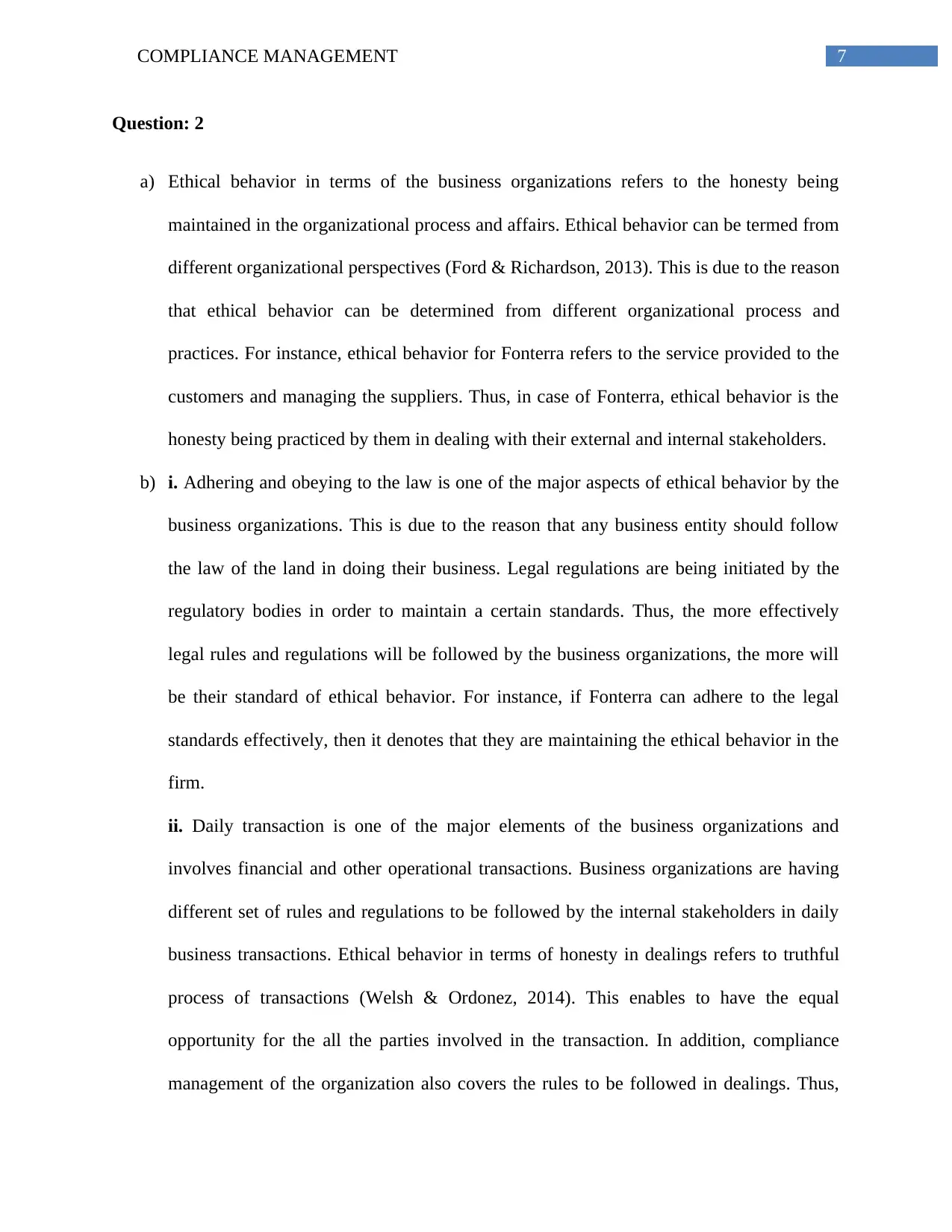
7COMPLIANCE MANAGEMENT
Question: 2
a) Ethical behavior in terms of the business organizations refers to the honesty being
maintained in the organizational process and affairs. Ethical behavior can be termed from
different organizational perspectives (Ford & Richardson, 2013). This is due to the reason
that ethical behavior can be determined from different organizational process and
practices. For instance, ethical behavior for Fonterra refers to the service provided to the
customers and managing the suppliers. Thus, in case of Fonterra, ethical behavior is the
honesty being practiced by them in dealing with their external and internal stakeholders.
b) i. Adhering and obeying to the law is one of the major aspects of ethical behavior by the
business organizations. This is due to the reason that any business entity should follow
the law of the land in doing their business. Legal regulations are being initiated by the
regulatory bodies in order to maintain a certain standards. Thus, the more effectively
legal rules and regulations will be followed by the business organizations, the more will
be their standard of ethical behavior. For instance, if Fonterra can adhere to the legal
standards effectively, then it denotes that they are maintaining the ethical behavior in the
firm.
ii. Daily transaction is one of the major elements of the business organizations and
involves financial and other operational transactions. Business organizations are having
different set of rules and regulations to be followed by the internal stakeholders in daily
business transactions. Ethical behavior in terms of honesty in dealings refers to truthful
process of transactions (Welsh & Ordonez, 2014). This enables to have the equal
opportunity for the all the parties involved in the transaction. In addition, compliance
management of the organization also covers the rules to be followed in dealings. Thus,
Question: 2
a) Ethical behavior in terms of the business organizations refers to the honesty being
maintained in the organizational process and affairs. Ethical behavior can be termed from
different organizational perspectives (Ford & Richardson, 2013). This is due to the reason
that ethical behavior can be determined from different organizational process and
practices. For instance, ethical behavior for Fonterra refers to the service provided to the
customers and managing the suppliers. Thus, in case of Fonterra, ethical behavior is the
honesty being practiced by them in dealing with their external and internal stakeholders.
b) i. Adhering and obeying to the law is one of the major aspects of ethical behavior by the
business organizations. This is due to the reason that any business entity should follow
the law of the land in doing their business. Legal regulations are being initiated by the
regulatory bodies in order to maintain a certain standards. Thus, the more effectively
legal rules and regulations will be followed by the business organizations, the more will
be their standard of ethical behavior. For instance, if Fonterra can adhere to the legal
standards effectively, then it denotes that they are maintaining the ethical behavior in the
firm.
ii. Daily transaction is one of the major elements of the business organizations and
involves financial and other operational transactions. Business organizations are having
different set of rules and regulations to be followed by the internal stakeholders in daily
business transactions. Ethical behavior in terms of honesty in dealings refers to truthful
process of transactions (Welsh & Ordonez, 2014). This enables to have the equal
opportunity for the all the parties involved in the transaction. In addition, compliance
management of the organization also covers the rules to be followed in dealings. Thus,
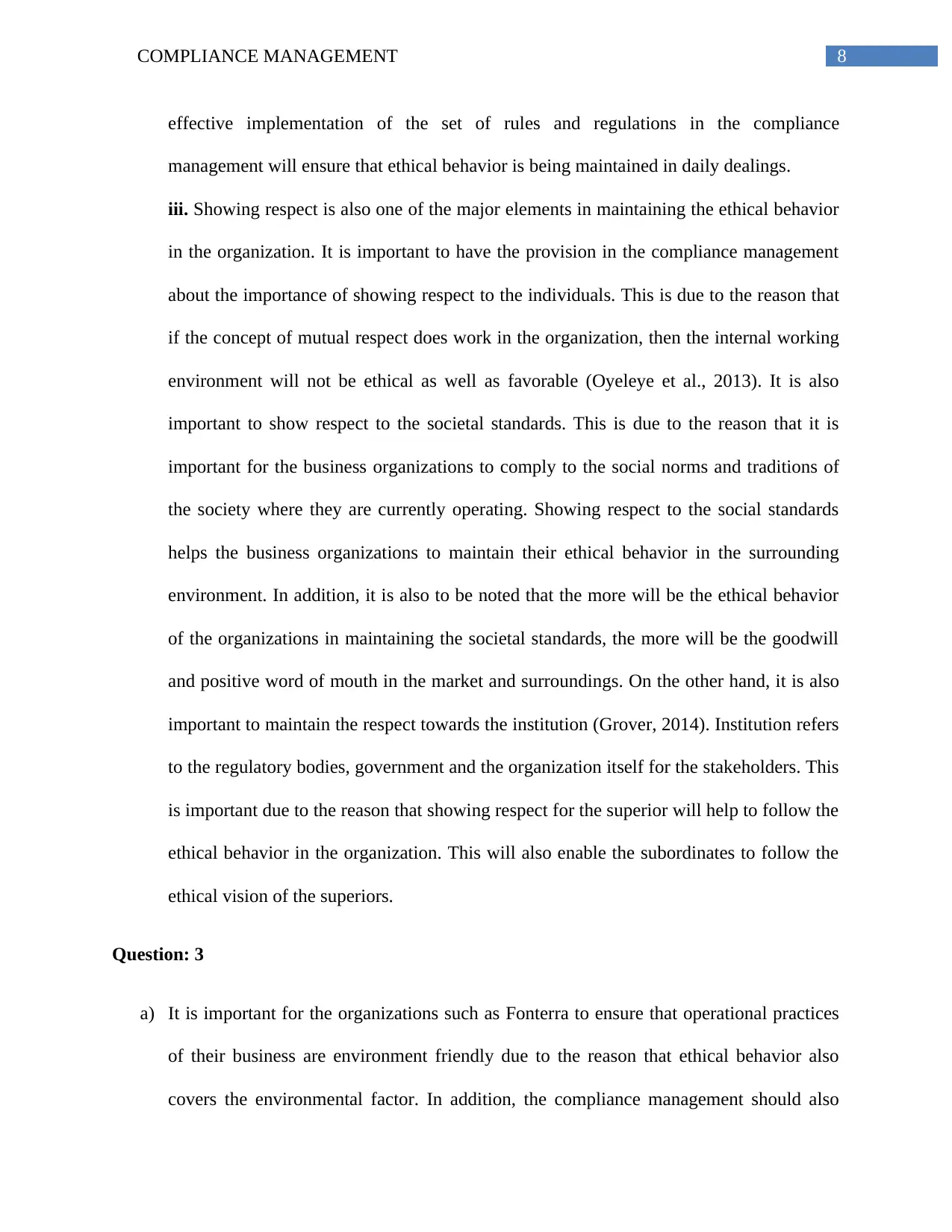
8COMPLIANCE MANAGEMENT
effective implementation of the set of rules and regulations in the compliance
management will ensure that ethical behavior is being maintained in daily dealings.
iii. Showing respect is also one of the major elements in maintaining the ethical behavior
in the organization. It is important to have the provision in the compliance management
about the importance of showing respect to the individuals. This is due to the reason that
if the concept of mutual respect does work in the organization, then the internal working
environment will not be ethical as well as favorable (Oyeleye et al., 2013). It is also
important to show respect to the societal standards. This is due to the reason that it is
important for the business organizations to comply to the social norms and traditions of
the society where they are currently operating. Showing respect to the social standards
helps the business organizations to maintain their ethical behavior in the surrounding
environment. In addition, it is also to be noted that the more will be the ethical behavior
of the organizations in maintaining the societal standards, the more will be the goodwill
and positive word of mouth in the market and surroundings. On the other hand, it is also
important to maintain the respect towards the institution (Grover, 2014). Institution refers
to the regulatory bodies, government and the organization itself for the stakeholders. This
is important due to the reason that showing respect for the superior will help to follow the
ethical behavior in the organization. This will also enable the subordinates to follow the
ethical vision of the superiors.
Question: 3
a) It is important for the organizations such as Fonterra to ensure that operational practices
of their business are environment friendly due to the reason that ethical behavior also
covers the environmental factor. In addition, the compliance management should also
effective implementation of the set of rules and regulations in the compliance
management will ensure that ethical behavior is being maintained in daily dealings.
iii. Showing respect is also one of the major elements in maintaining the ethical behavior
in the organization. It is important to have the provision in the compliance management
about the importance of showing respect to the individuals. This is due to the reason that
if the concept of mutual respect does work in the organization, then the internal working
environment will not be ethical as well as favorable (Oyeleye et al., 2013). It is also
important to show respect to the societal standards. This is due to the reason that it is
important for the business organizations to comply to the social norms and traditions of
the society where they are currently operating. Showing respect to the social standards
helps the business organizations to maintain their ethical behavior in the surrounding
environment. In addition, it is also to be noted that the more will be the ethical behavior
of the organizations in maintaining the societal standards, the more will be the goodwill
and positive word of mouth in the market and surroundings. On the other hand, it is also
important to maintain the respect towards the institution (Grover, 2014). Institution refers
to the regulatory bodies, government and the organization itself for the stakeholders. This
is important due to the reason that showing respect for the superior will help to follow the
ethical behavior in the organization. This will also enable the subordinates to follow the
ethical vision of the superiors.
Question: 3
a) It is important for the organizations such as Fonterra to ensure that operational practices
of their business are environment friendly due to the reason that ethical behavior also
covers the environmental factor. In addition, the compliance management should also
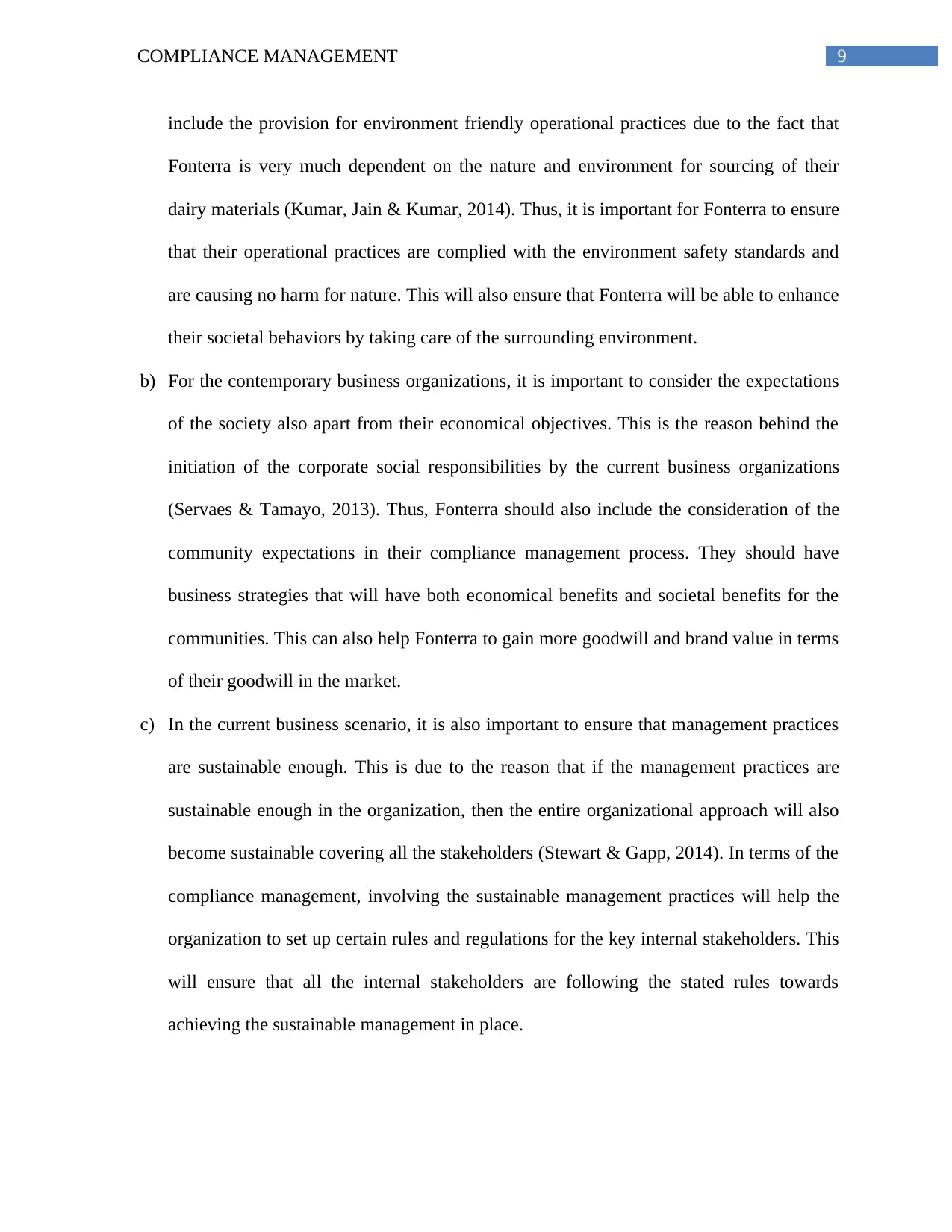
9COMPLIANCE MANAGEMENT
include the provision for environment friendly operational practices due to the fact that
Fonterra is very much dependent on the nature and environment for sourcing of their
dairy materials (Kumar, Jain & Kumar, 2014). Thus, it is important for Fonterra to ensure
that their operational practices are complied with the environment safety standards and
are causing no harm for nature. This will also ensure that Fonterra will be able to enhance
their societal behaviors by taking care of the surrounding environment.
b) For the contemporary business organizations, it is important to consider the expectations
of the society also apart from their economical objectives. This is the reason behind the
initiation of the corporate social responsibilities by the current business organizations
(Servaes & Tamayo, 2013). Thus, Fonterra should also include the consideration of the
community expectations in their compliance management process. They should have
business strategies that will have both economical benefits and societal benefits for the
communities. This can also help Fonterra to gain more goodwill and brand value in terms
of their goodwill in the market.
c) In the current business scenario, it is also important to ensure that management practices
are sustainable enough. This is due to the reason that if the management practices are
sustainable enough in the organization, then the entire organizational approach will also
become sustainable covering all the stakeholders (Stewart & Gapp, 2014). In terms of the
compliance management, involving the sustainable management practices will help the
organization to set up certain rules and regulations for the key internal stakeholders. This
will ensure that all the internal stakeholders are following the stated rules towards
achieving the sustainable management in place.
include the provision for environment friendly operational practices due to the fact that
Fonterra is very much dependent on the nature and environment for sourcing of their
dairy materials (Kumar, Jain & Kumar, 2014). Thus, it is important for Fonterra to ensure
that their operational practices are complied with the environment safety standards and
are causing no harm for nature. This will also ensure that Fonterra will be able to enhance
their societal behaviors by taking care of the surrounding environment.
b) For the contemporary business organizations, it is important to consider the expectations
of the society also apart from their economical objectives. This is the reason behind the
initiation of the corporate social responsibilities by the current business organizations
(Servaes & Tamayo, 2013). Thus, Fonterra should also include the consideration of the
community expectations in their compliance management process. They should have
business strategies that will have both economical benefits and societal benefits for the
communities. This can also help Fonterra to gain more goodwill and brand value in terms
of their goodwill in the market.
c) In the current business scenario, it is also important to ensure that management practices
are sustainable enough. This is due to the reason that if the management practices are
sustainable enough in the organization, then the entire organizational approach will also
become sustainable covering all the stakeholders (Stewart & Gapp, 2014). In terms of the
compliance management, involving the sustainable management practices will help the
organization to set up certain rules and regulations for the key internal stakeholders. This
will ensure that all the internal stakeholders are following the stated rules towards
achieving the sustainable management in place.
Secure Best Marks with AI Grader
Need help grading? Try our AI Grader for instant feedback on your assignments.
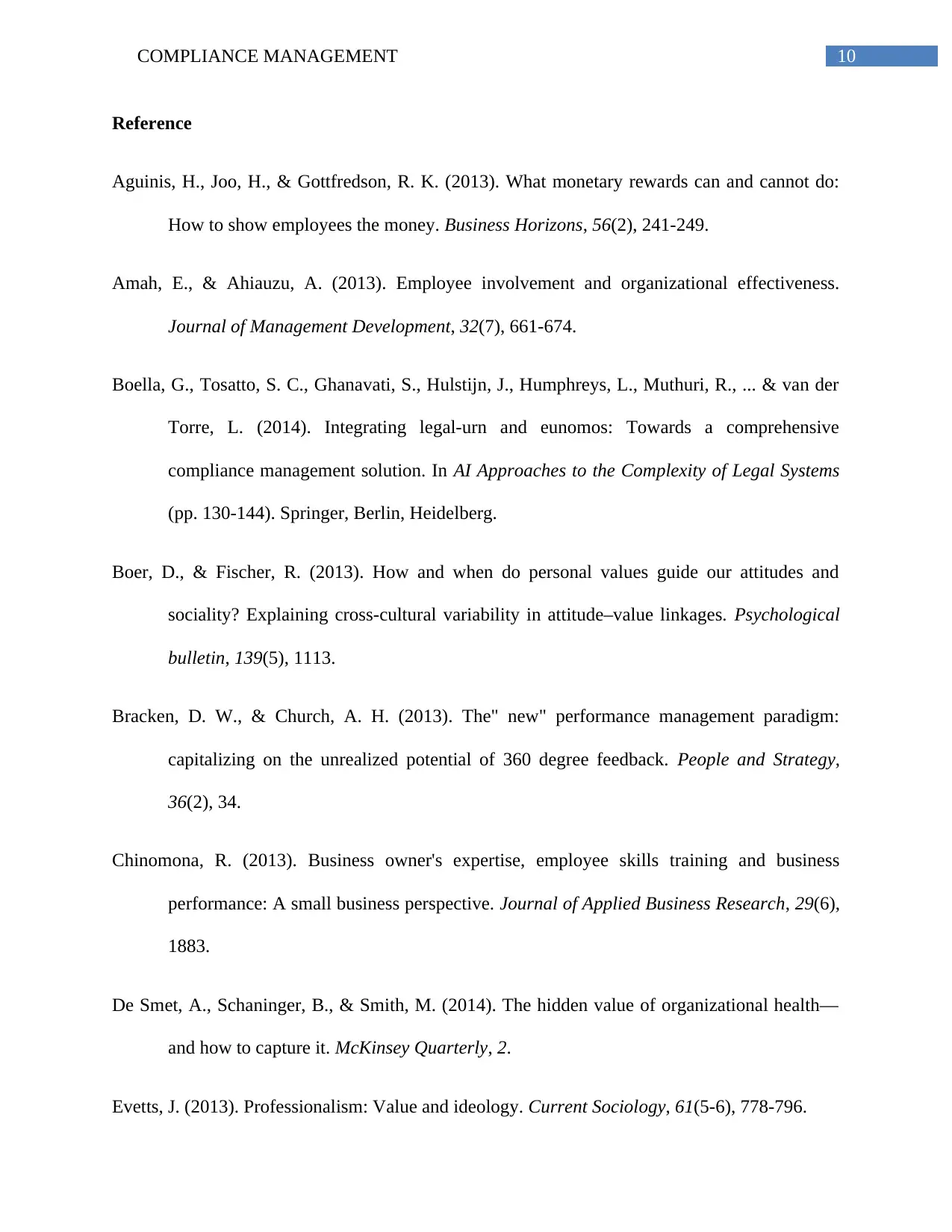
10COMPLIANCE MANAGEMENT
Reference
Aguinis, H., Joo, H., & Gottfredson, R. K. (2013). What monetary rewards can and cannot do:
How to show employees the money. Business Horizons, 56(2), 241-249.
Amah, E., & Ahiauzu, A. (2013). Employee involvement and organizational effectiveness.
Journal of Management Development, 32(7), 661-674.
Boella, G., Tosatto, S. C., Ghanavati, S., Hulstijn, J., Humphreys, L., Muthuri, R., ... & van der
Torre, L. (2014). Integrating legal-urn and eunomos: Towards a comprehensive
compliance management solution. In AI Approaches to the Complexity of Legal Systems
(pp. 130-144). Springer, Berlin, Heidelberg.
Boer, D., & Fischer, R. (2013). How and when do personal values guide our attitudes and
sociality? Explaining cross-cultural variability in attitude–value linkages. Psychological
bulletin, 139(5), 1113.
Bracken, D. W., & Church, A. H. (2013). The" new" performance management paradigm:
capitalizing on the unrealized potential of 360 degree feedback. People and Strategy,
36(2), 34.
Chinomona, R. (2013). Business owner's expertise, employee skills training and business
performance: A small business perspective. Journal of Applied Business Research, 29(6),
1883.
De Smet, A., Schaninger, B., & Smith, M. (2014). The hidden value of organizational health—
and how to capture it. McKinsey Quarterly, 2.
Evetts, J. (2013). Professionalism: Value and ideology. Current Sociology, 61(5-6), 778-796.
Reference
Aguinis, H., Joo, H., & Gottfredson, R. K. (2013). What monetary rewards can and cannot do:
How to show employees the money. Business Horizons, 56(2), 241-249.
Amah, E., & Ahiauzu, A. (2013). Employee involvement and organizational effectiveness.
Journal of Management Development, 32(7), 661-674.
Boella, G., Tosatto, S. C., Ghanavati, S., Hulstijn, J., Humphreys, L., Muthuri, R., ... & van der
Torre, L. (2014). Integrating legal-urn and eunomos: Towards a comprehensive
compliance management solution. In AI Approaches to the Complexity of Legal Systems
(pp. 130-144). Springer, Berlin, Heidelberg.
Boer, D., & Fischer, R. (2013). How and when do personal values guide our attitudes and
sociality? Explaining cross-cultural variability in attitude–value linkages. Psychological
bulletin, 139(5), 1113.
Bracken, D. W., & Church, A. H. (2013). The" new" performance management paradigm:
capitalizing on the unrealized potential of 360 degree feedback. People and Strategy,
36(2), 34.
Chinomona, R. (2013). Business owner's expertise, employee skills training and business
performance: A small business perspective. Journal of Applied Business Research, 29(6),
1883.
De Smet, A., Schaninger, B., & Smith, M. (2014). The hidden value of organizational health—
and how to capture it. McKinsey Quarterly, 2.
Evetts, J. (2013). Professionalism: Value and ideology. Current Sociology, 61(5-6), 778-796.
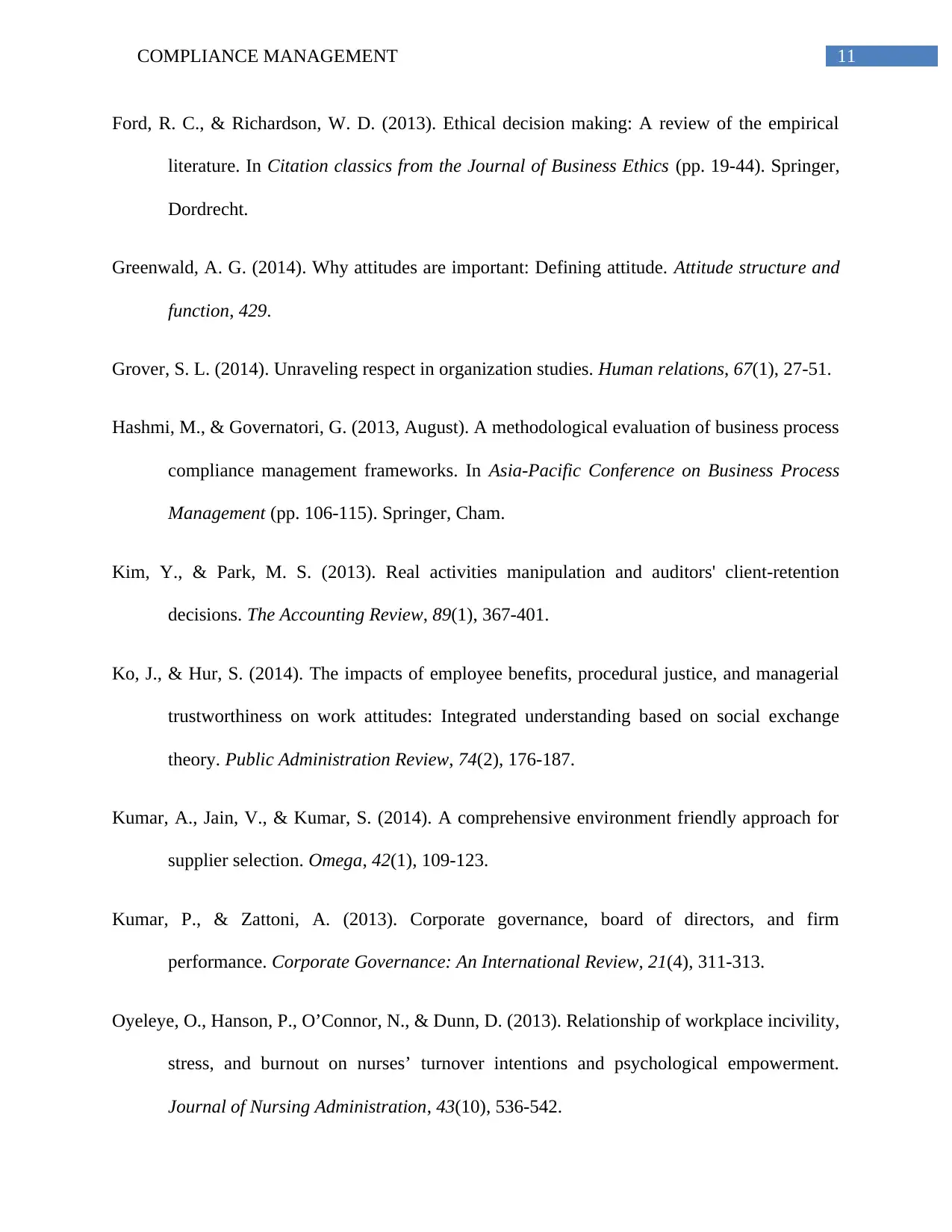
11COMPLIANCE MANAGEMENT
Ford, R. C., & Richardson, W. D. (2013). Ethical decision making: A review of the empirical
literature. In Citation classics from the Journal of Business Ethics (pp. 19-44). Springer,
Dordrecht.
Greenwald, A. G. (2014). Why attitudes are important: Defining attitude. Attitude structure and
function, 429.
Grover, S. L. (2014). Unraveling respect in organization studies. Human relations, 67(1), 27-51.
Hashmi, M., & Governatori, G. (2013, August). A methodological evaluation of business process
compliance management frameworks. In Asia-Pacific Conference on Business Process
Management (pp. 106-115). Springer, Cham.
Kim, Y., & Park, M. S. (2013). Real activities manipulation and auditors' client-retention
decisions. The Accounting Review, 89(1), 367-401.
Ko, J., & Hur, S. (2014). The impacts of employee benefits, procedural justice, and managerial
trustworthiness on work attitudes: Integrated understanding based on social exchange
theory. Public Administration Review, 74(2), 176-187.
Kumar, A., Jain, V., & Kumar, S. (2014). A comprehensive environment friendly approach for
supplier selection. Omega, 42(1), 109-123.
Kumar, P., & Zattoni, A. (2013). Corporate governance, board of directors, and firm
performance. Corporate Governance: An International Review, 21(4), 311-313.
Oyeleye, O., Hanson, P., O’Connor, N., & Dunn, D. (2013). Relationship of workplace incivility,
stress, and burnout on nurses’ turnover intentions and psychological empowerment.
Journal of Nursing Administration, 43(10), 536-542.
Ford, R. C., & Richardson, W. D. (2013). Ethical decision making: A review of the empirical
literature. In Citation classics from the Journal of Business Ethics (pp. 19-44). Springer,
Dordrecht.
Greenwald, A. G. (2014). Why attitudes are important: Defining attitude. Attitude structure and
function, 429.
Grover, S. L. (2014). Unraveling respect in organization studies. Human relations, 67(1), 27-51.
Hashmi, M., & Governatori, G. (2013, August). A methodological evaluation of business process
compliance management frameworks. In Asia-Pacific Conference on Business Process
Management (pp. 106-115). Springer, Cham.
Kim, Y., & Park, M. S. (2013). Real activities manipulation and auditors' client-retention
decisions. The Accounting Review, 89(1), 367-401.
Ko, J., & Hur, S. (2014). The impacts of employee benefits, procedural justice, and managerial
trustworthiness on work attitudes: Integrated understanding based on social exchange
theory. Public Administration Review, 74(2), 176-187.
Kumar, A., Jain, V., & Kumar, S. (2014). A comprehensive environment friendly approach for
supplier selection. Omega, 42(1), 109-123.
Kumar, P., & Zattoni, A. (2013). Corporate governance, board of directors, and firm
performance. Corporate Governance: An International Review, 21(4), 311-313.
Oyeleye, O., Hanson, P., O’Connor, N., & Dunn, D. (2013). Relationship of workplace incivility,
stress, and burnout on nurses’ turnover intentions and psychological empowerment.
Journal of Nursing Administration, 43(10), 536-542.
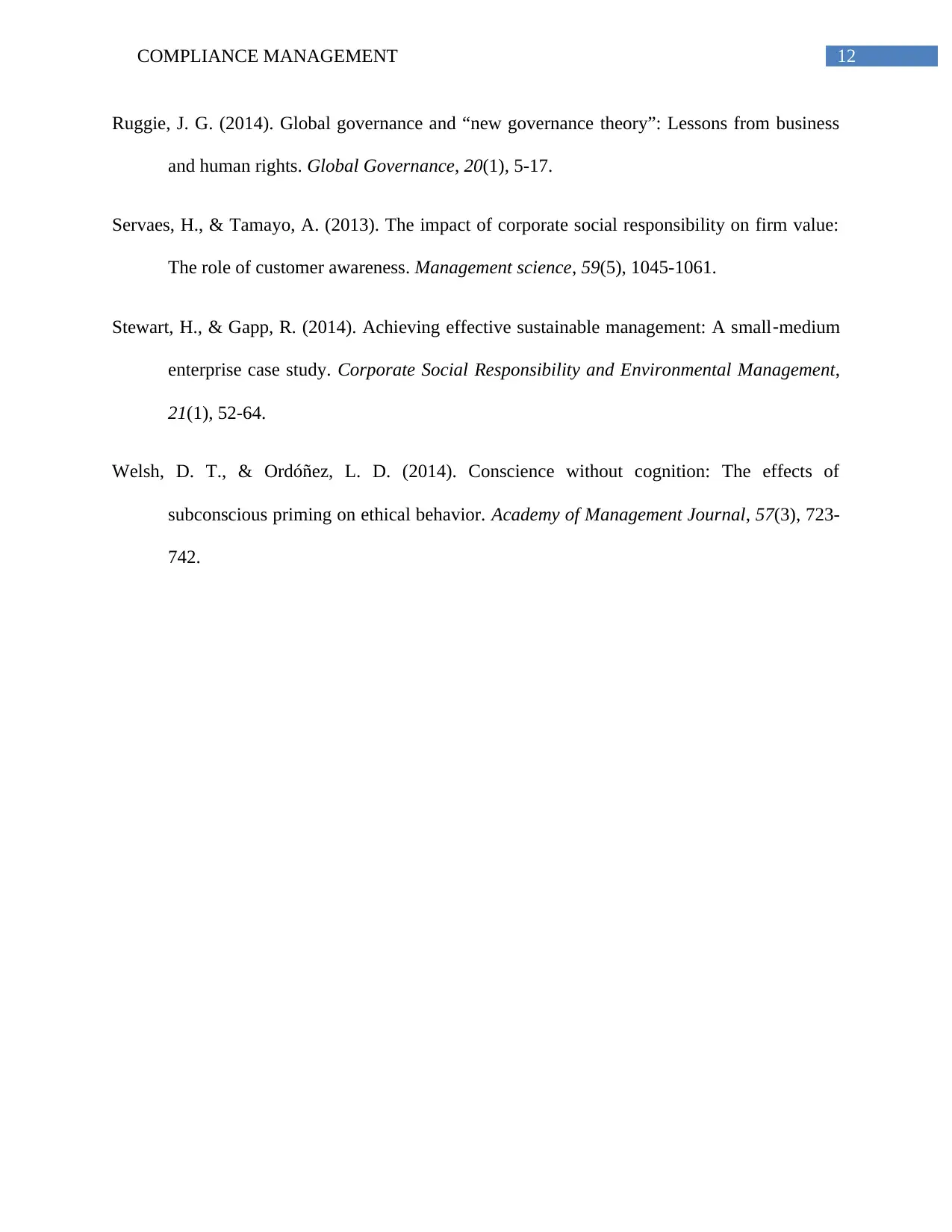
12COMPLIANCE MANAGEMENT
Ruggie, J. G. (2014). Global governance and “new governance theory”: Lessons from business
and human rights. Global Governance, 20(1), 5-17.
Servaes, H., & Tamayo, A. (2013). The impact of corporate social responsibility on firm value:
The role of customer awareness. Management science, 59(5), 1045-1061.
Stewart, H., & Gapp, R. (2014). Achieving effective sustainable management: A small‐medium
enterprise case study. Corporate Social Responsibility and Environmental Management,
21(1), 52-64.
Welsh, D. T., & Ordóñez, L. D. (2014). Conscience without cognition: The effects of
subconscious priming on ethical behavior. Academy of Management Journal, 57(3), 723-
742.
Ruggie, J. G. (2014). Global governance and “new governance theory”: Lessons from business
and human rights. Global Governance, 20(1), 5-17.
Servaes, H., & Tamayo, A. (2013). The impact of corporate social responsibility on firm value:
The role of customer awareness. Management science, 59(5), 1045-1061.
Stewart, H., & Gapp, R. (2014). Achieving effective sustainable management: A small‐medium
enterprise case study. Corporate Social Responsibility and Environmental Management,
21(1), 52-64.
Welsh, D. T., & Ordóñez, L. D. (2014). Conscience without cognition: The effects of
subconscious priming on ethical behavior. Academy of Management Journal, 57(3), 723-
742.
1 out of 13
Related Documents
Your All-in-One AI-Powered Toolkit for Academic Success.
+13062052269
info@desklib.com
Available 24*7 on WhatsApp / Email
![[object Object]](/_next/static/media/star-bottom.7253800d.svg)
Unlock your academic potential
© 2024 | Zucol Services PVT LTD | All rights reserved.





